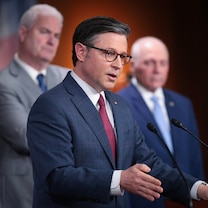Kids' Health at Risk as Politicians Argue
Thousands of Ga. families locked out of a successful insurance program.
June 17, 2007 — -- Michael Post is a Georgia preacher who believes in less government and more personal responsibility. But he says having a daughter with severe autism has taught him he must depend on government for some things.
Therapy for his daughter Cadence, who is 4, costs $25,000 per year, roughly half the family income. She would not be getting that therapy if it were not for a government insurance program for children called SCHIP, or State Children's Health Insurance Program, that is funded with both federal and state dollars.
Michael Post and his wife Connie believe the investment taxpayers are making now will be paid back to them when Cadence grows up.
"We have a lot of hope for our daughter that she can be pulled out of this prison of autism," Michael Post said.
"Our goal for Cadence is to help her reach a measure of independence so she can give back," said Connie Post. "That is what we want for her. But if she does not have early intervention, then there is little or no hope for that."
The Posts are lucky to have SCHIP insurance. In Georgia, where they live, the rolls are now closed. Families not already enrolled are locked out. Georgia was the first state to run out of money, but other states are in trouble.
The SCHIPS program has become a victim of its own success. It was designed for familes who earn too much to qualify for Medicaid, but too little to afford private insurance. But in many states like Georgia, there were far more of those families than there was money available.
Congress recently voted Georgia an additional $121 million in emergency funds, but it is not enough for Georgia to completely open the rolls. It is opening only an additional 15,000 slots, just a fraction of the demand.
The Willinghams are not so lucky. They too are eligible for SCHIPS, but they are locked out. Each month they must find $800 to buy medicine for their son Shane, to prevent his seizures.
"I mean, we have to buy his medicine," said his mother Carla Willingham. "And there's nothing we can do, nothing we can do to help him."




